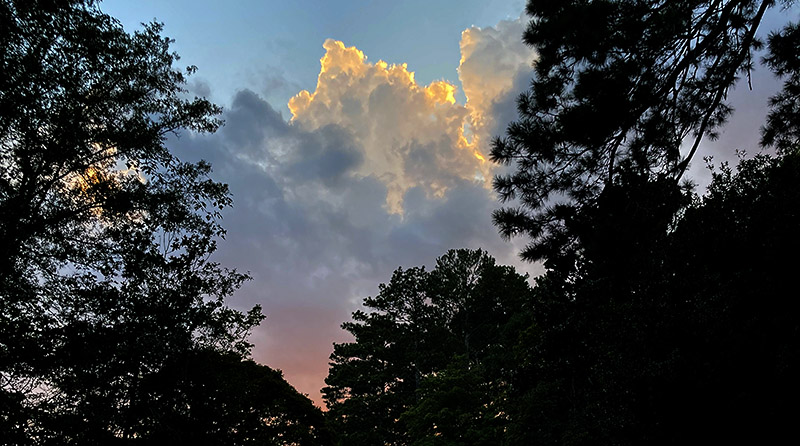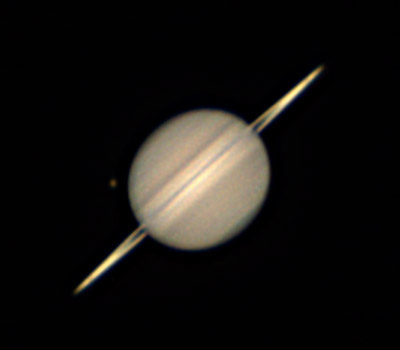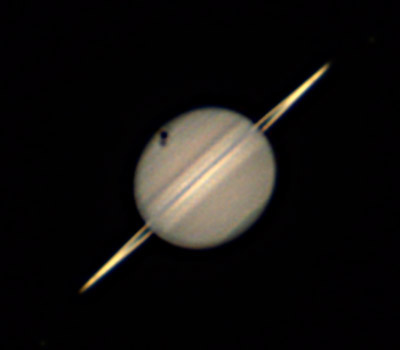|
Cloudscape

I often see dramatically lit clouds while taking my evening walk.
This is from yesterday (September 8). (iPhone photo, cropped.)
Permanent link to this entry
Science and the paranormal
Yesterday I read much of George Abell and Barry Singer's 1981 book
Science
and the Paranormal.
It takes on many of the strange ideas that were fashionable at the end of the 1970s,
some of which are older and are still with us. The book is vaguely skeptical of religion,
but only vaguely; they do not attack serious theology, only haphazard beliefs in the supernatural.
The book has contributions by many authors. Some tidbits:
Carl Sagan's dissection of Velikovsky's cosmology is worth reading. Velikovsky's
astrophysics is complete nonsense. His ancient history is also very dubious.
In addition to the false physics,
Sagan focuses on errors of logic, such as conflating events that must have happened
many thousands of years apart.
Most of the Bermuda Triangle incidents of disappearing ships seem to have been fictitious.
Parapsychology (ESP) was, in retrospect, made almost entirely of biased observations, or so it seems.
The authors tried hard to find some solid evidence, and it wasn't there.
Biorhythms are so silly that I'm amazed they ever had a following. Why should the human body's
natural rhythms be absolutely fixed, the same for everyone, not disrupted even in infancy or
severe illness? That's an objection I was already raising back then.
When Uranus, Neptune, and Pluto were discovered, astrologers (horoscope fortunetellers)
added them to their system, giving them "influences" based on the Greek gods they were named after,
even though those names had been chosen in modern times by people who did not believe in any such "influences."
If that doesn't show that horoscopes are a pretending game, I don't know what does.
There's an article by Philip Klass taking apart UFOs in his Klass-ic way.
(See my earlier Notebook entry about him.)
There's some good philosophy of science in the book (as befits Abell, who was strong on that);
at least one of the contributors points out that being too skeptical can itself lead you to
false conclusions.
On the whole, logic and openmindedness win. The book is worth reading, at least if you were
exposed to 1970s silliness.
Permanent link to this entry
Cataract report
This is day 27 for the right eye, which has basically settled down, and day 12 for the left
eye, whose refraction is still fluctuating — the left eye is currently about -1.00 myopic
due to corneal swelling.
A couple of weeks ago, when the right eye was in that state and
I was wearing glasses that did not correct my (unoperated) left eye at all, Melody took me to Costco and I found it
rather frightening to be walking around with that degree of nearsightedness. I could see everything necessary;
I wasn't about to lose my way; but it was disconcerting.
Fortunately now I have
one really good eye (on the right) while the other settles down. I should add that there is nothing
wrong with its vision except this fluctuating nearsightedness. I am enjoying being able to see so well.
Unfortunately, my right eye has gotten some kind of eyelid infection or possibly rosacea, which is
annoying. It is not related to my cataract surgery and is not a threat to my vision, just a bother.
I should add that everything looks about 15% bigger because I am no longer wearing strong concave glasses.
My eyes also look bigger as seen through my glasses; I need to get a new portrait taken for this web page
and other purposes.
Permanent link to this entry
How far we've come
The other day I read a Reddit story about a young man who ditched a woman midway through their first date
because she wanted to smoke a cigarette in his car.
I don't know if the story is true; the point is, it circulates in our time, and
the audience isn't supposed to think it's crazy.
Contrast how that story would have been received in the 1960s or early 1970s.
Back then, smokers were superior; they claimed the privilege of making everyone else breathe
secondhand smoke; and if you objected, you were considered rude.
How did civilized people ever sink that low? I can only surmise that their thoughts were
twisted by a strongly addictive drug.
It has been a third of a century since indoor air commonly became smoke-free.
I credit this largely to studies showing that
secondhand smoke is a health hazard
and to liability insurance companies that noticed this.
But, also, smoking was already going out of fashion among high-achieving people even before the Surgeon General's 1964 report.
General Eisenhower quit smoking in 1949 as a demonstration of his self-control.
John F. Kennedy and Jacqueline Kennedy smoked but wouldn't let the public see them doing it.
Thinking back to the neighborhood I lived in as a child, although my parents smoked, the bulk of the other
adults did not — far less than the national average of 60%.
It was very noticeable, even in the mid-1960s, that more-educated, higher-achieving people were distinctly
less likely to smoke, though it wasn't absolute.
I am an asthma sufferer whose parents smoked. My asthma wasn't diagnosed until they had both already died (at regrettably
early ages). They were willing to respect my dislike for breathing smoke, but they thought it was an idiosyncratic
habit of mine — neither they nor I realized that the choking that I felt around secondhand smoke was
different from other people's experience.
One last item. In a social media conversation a few years ago, someone asked about the smoking areas that high schools
used to have in the 1960s and early 1970s. (I saw one at Valdosta High School, and I was at the meeting where a student
committee at Valwood recommended against having one, which marked us as some kind of newfangled radicals in 1971.)
Well, what came out, in this large conversation, was that several of us remembered seeing the smoking areas, but we
had not used them and weren't able to answer questions about how they were managed.
After a while we figured it out — the people who has been using the smoking areas in the mid-1960s
were dead! They would be in their mid-70s now, or older, and smokers simply don't live that long!
A 15-year difference in lifespan is not happy news for smokers.
Permanent link to this entry


|










